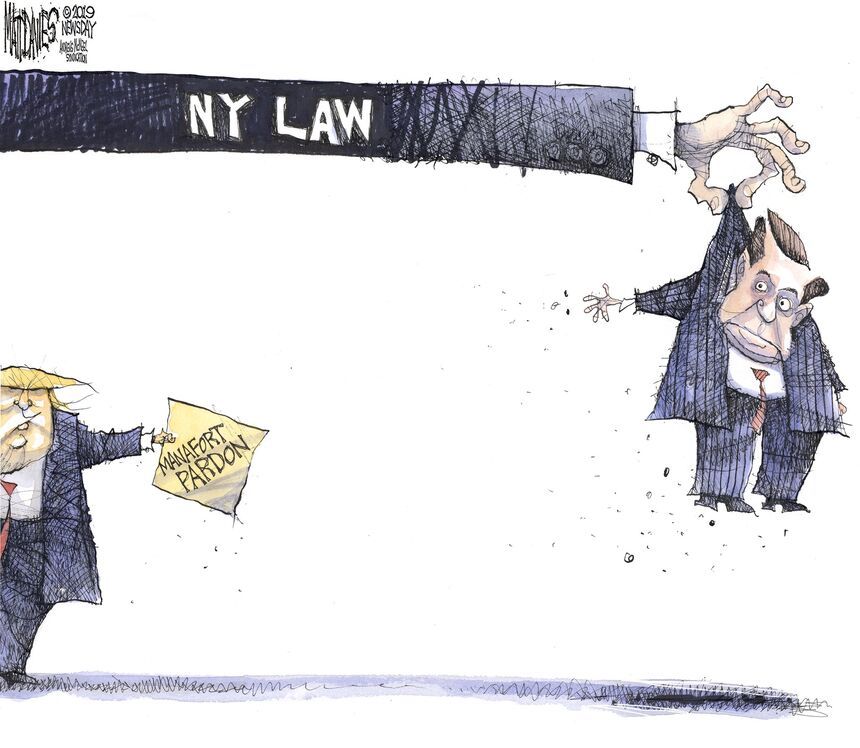CSotD: It’s a hard rain of folly’s gonna fall
Skip to commentsCongrats to Dave Granlund, mostly in contrast to those cartoonists who did cartoons about the Max8s still being in the air, only to have Dear Leader come sliding in, spikes high, at deadline time to announce he was grounding them.
Trump could really mess with the press by doing that more often — serve up an outrage and then yank it out from under them after they’ve crafted their responses.
Though Jim Morin had already come up with a Trump-Proof commentary the day before, and the stock drop did seem to get at least as much coverage as the loss of life.
Two things I found interesting in the Max8 crashes:
The first one, in the Java Sea off Indonesia, seemed to get the same “dead brown people” coverage we give to ferry sinkings on that side of the globe.
The second, the one in Ethiopia, started out the same way, but two things intervened:
One was airline experts piping up to point out that Ethiopian Airlines is a very high quality company with an excellent service record and an even more enviable safety record.
The other was that the flight was headed towards a UN conference and so not only were there white folks on board, but many of the black and brown folks were well-educated, well-connected types, none of them clutching chickens or goats as the plane went down.
I suppose it depends on how you’ve cultivated your social media, but I saw enough posts from grieving friends and colleagues around the world that it immediately shook the “dead brown people” image from my mind.
Whatever the downside of social media — and stay tuned for that — it has given us the potential to have friends in far places, and forces those of us in the First World to be a little more inclusive in our thinking.
Well, maybe not “forces us,” but “allows us.”
A lot still depends on the quality of our souls.
Juxtaposition of the Day #1
Meanwhile, under the category of “News That Is Hard To Spin,” one judge dropped the hammer on Paul Manafort, not so much in the sentence she handed out but in her commentary, in which she assured him and the public that this is not a nothingburger.
Following which his attorney announced on the street that she had called it a nothingburger, to the derisive hoots of a crowd that knew what she’d said.
And it allowed Ann Telnaes to update her Somethingburger. It’s always fun to pick out the bit players on the lower layers of that evolving — one might say “metastasizing” — gustatory delight.
And following that — “following” as a Ringling elephant used to walk with her trunk grasping the tail of the one in front — a second judge handed down a NY State indictment, giving Matt Davies an unrelated cartoon on the same topic.
At this stage, it’s like a game of 8-ball on one of those small barroom tables: You get the ball you aimed at, but you’ll probably knock in one or two more besides.
With Nancy Pelosi over your shoulder reminding you to save the 8-ball for last.
Juxtaposition of the Day #2
This may be the most striking Juxtaposition of the year, almost as if they had sat down and planned it.
Lowe explains that wealth has its advantages, while Eagan explains that, yeah, we knew that.
An NPR reporter found a general lack of shock to be the response of college students, which fits in with much of what I said yesterday, while a second NPR report fits in with much else was said there.
Bottom Line: This doesn’t impact very many students and getting into an Ivy is a dubious advantage anyway.
However, you may expect this story to stay at the top of national consciousness because it has an attractively separate pair of hooks:
For rightwingers, it proves that those elitist liberal eggheads are a bunch of crooks and fakers.
For leftwingers, it proves that the ivy-covered halls of academia are unjustly preserved for rich white elitists.
At last! Something we can agree on!
Meanwhile …
Phil Hands offers a cynical view of the Democrats’ choice of a site for their national convention. As the poet wrote, “The best part of breaking up is when I know that I’m making up with you.”
As a card-carrying bumpkin, I can assure you the overall feeling of rejection by major parties and major media is real, and, BTW, it’s not helped by hearing city folks declare that we need to get rid of the Electoral College and make the Senate based on population.
Both are backbones of the Federalist system.
(Or would you have put the Civil Rights Act to a national referendum?)
Paying Wisconsin a little more attention this time around might help the Democratic cause, but the real change would come if, as Clay Bennett suggests, more working people became aware that, for all the ball caps and lip service, the other side doesn’t give a damn about them.
The good news is that the House has passed a bill restoring many of the better points of a functioning democracy in a diverse nation.
The bad news is that it will never get through the Senate, and Kal Kallaugher explains why.
This roadblock-and-collaborator got another six year term in 2018. If you want him out of the way, the only practical solution is to rob him of his majority in 2020.
Here’s an interactive map with the Senate possibilities in the next election. Bottom line: The Democrats need to switch 3 or 4 to gain control.
My prediction: They will, or perhaps they won’t.
And, as Silicon Valley contemplates a monument to itself, David Horsey offers a design that may also help explain the outcome of those 2020 elections.
Social media has made some of us more sensitive to the deaths in Ethiopia.
And it’s making some of us less sensitive to each other.
Much rides on the actual numbers.
And on the actual people.










Comments 9
Comments are closed.